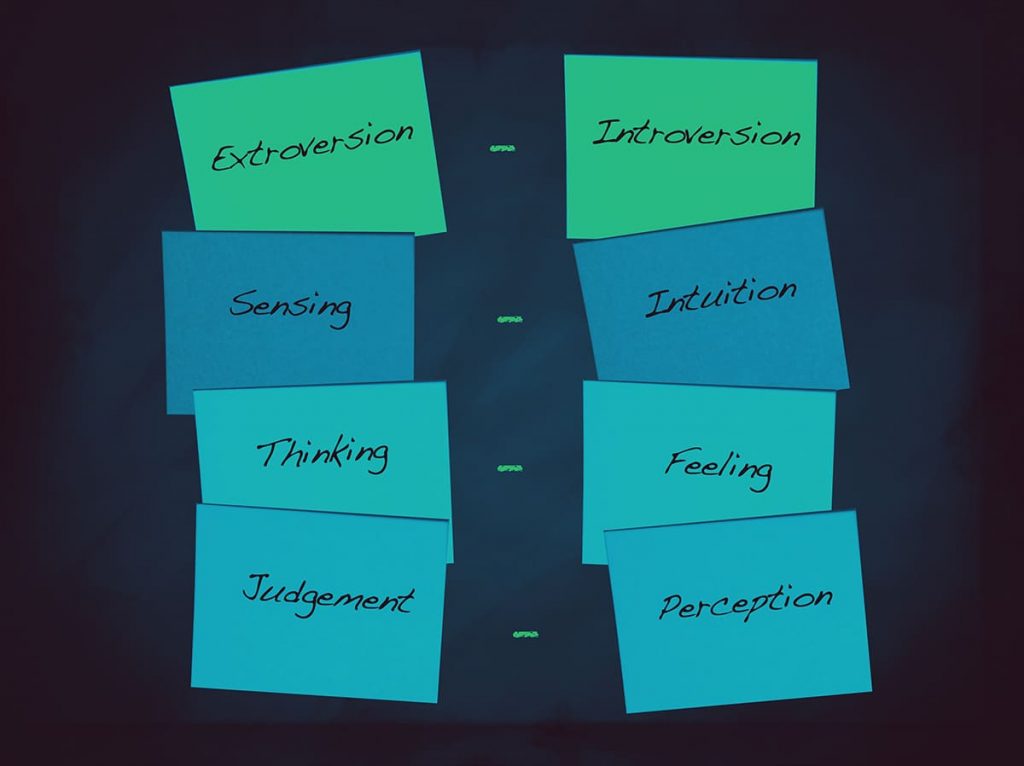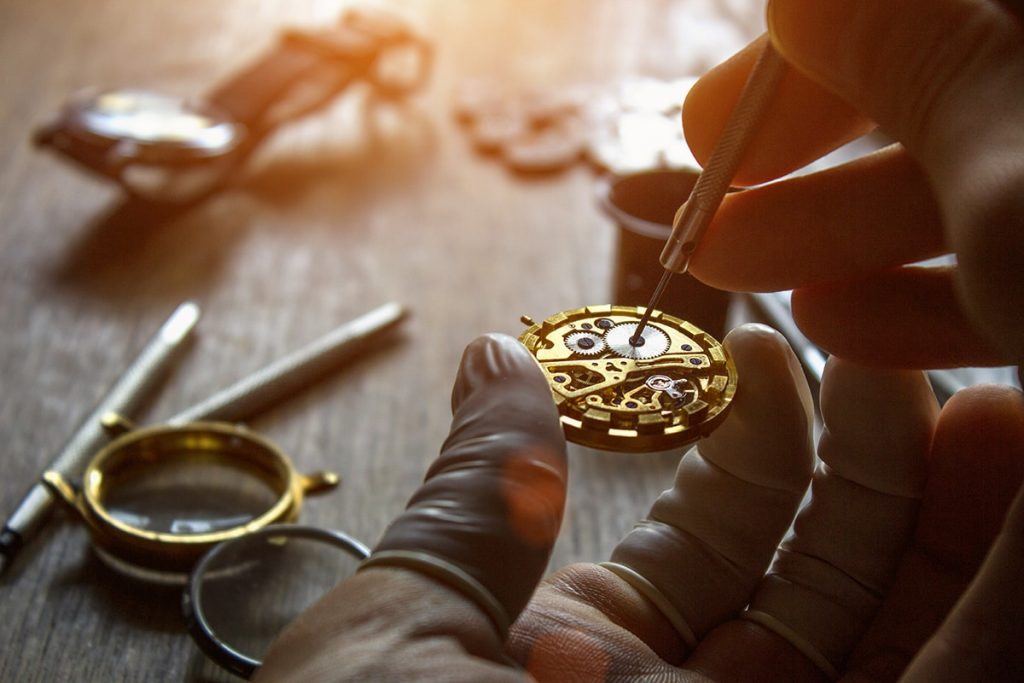
The Myers-Briggs type indicator (MBTI) knows 16 different personality types. When you take an MBTI personality test, the result is a combination of four letters. "Insiders" talk about ESFJ and ISTP like old friends. Don't know what you're talking about? Here's what the 16 abbreviations mean.
The Myers-Briggs types are based on findings of the Swiss psychologist Carl Gustav Jung. In the 1920s Jung developed his theory of types, according to which a person's thinking and feeling, cognition and perception can be oriented outwardly or inwardly. The Americans Katherine Briggs and Isabel Briggs Myers (Katherine's daughter) took up Jung's typology and developed their own personality theory with 16 personality types.
The MBTI test is used today by companies and career consultants, but also by dating agencies, to assess people - and in particular their suitability for certain tasks or "for each other". When thinking about life paths and relationships, for practical considerations as well as for the very big search for meaning, the MBTI test give interesting impulses.
The four letters of the 16 personality types stand for four character dimensions.
In the first place, Myers-Briggs puts the question of outside or inside orientation: How do you prefer to recharge your batteries? In interaction with others? Or do you prefer to be alone? There is an I ("introverted") or an E ("extroverted") for this.
The second letter describes how you form an image of the world. Do you orient yourself to what you can perceive with your five senses? Or do you peek behind the facade, see and analyze connections, find explanations? There's an S ("sensory") or an N ("intuitive" - the I is already assigned for "introverted"). The fact that MBTI uses the term "intuitive" for an analytical, questioning perception harks back to Carl Gustav Jung's expression, which differs somewhat from the colloquial use of the word.
In third place is your preferred decision-making mode. Do you weigh up all the information before making a carefully considered decision? Or are you less interested in the facts than your gut feeling? Myers-Briggs describes these two poles with T ("thinking" - thinking) and F ("feeling" - feeling).
The fourth letter concerns your Need for structure. A fixed plan, a clear moral compass, rules for every situation in life? Or should we first feel our way around, remain flexible, adapt? According to Myers-Briggs, this is the contrast between J ("judging") and P ("perceiving").

Depending on which of the two poles you tend towards in the four personality dimensions, there is a combination of four letters in the 16 personality type psychology that describes your character.
Because it can get confusing with so many different characters, the 16 personalities are usually divided into groups of four.
NFs perceive the world analytically and questioningly and make decisions based on feelings and values. Depending on the expression of the other characteristics, the following personalities emerge:
INFPs are the friendly, idealistic people-understanders among the 16 personality types. They are good at being alone, think deeply about the world, make emotion-based decisions, and live spontaneously and flexibly.
INFPs are good listeners, reserved with their own well-considered opinions and deeply empathetic with their fellow human beings. They have a firm moral compass, but judge kindly and with understanding. INFPs can be expected to offer creative ideas and valuable advice - but they are not the type to devise and follow the grand master plan. INFPs include writers, designers, musicians, consultants, and many other successful creatives and innovators.

ENFPs are the activists among the Myers-Briggs types. They enjoy being the center of attention, analyze themselves and the world with a clear mind, but decide and act emotionally and spontaneously.
Free spirits love life - and spread the spark to others! With Mayhem They are good with rules and conventions; rules and conventions are not their thing. The firmly established personal value system of a ENFP is usually not entirely in line with that of society; they make no secret of their sympathy for underdogs and their rejection of the "wrong life". Boredom is a red rag, they like to leave the detail work to others - but that's not a problem either, because they can motivate people! ENFPs include serial founders, social movement initiators, inspirational speakers ... and many fascinating personalities who don't fit into any pigeonhole.
INFJ's are something like the wise visionaries in the MBTI spectrum. They rest within themselves, have a deep understanding of people and contexts, make value- and emotion-based decisions - and strive for orderly structures in their lives and actions.
INFJ's can comprehensively analyze situations and thus foresee future developments with often astonishing accuracy. Advice and ideas from a INFJ have a hand and a foot - even if they are often surprising. The quiet idealists like to take life paths that accommodate their need for structure. This can be a position in an organization whose values they identify with (judge, teacher, advisor in important functions) - or a solitary lookout where they can build their edifices of thought undisturbed.
ENFJ's combine the analytical, idealistic, and structure-loving traits of a INFJ with a need for fellowship with others. This makes them born leaders - unlike the equally charismatic ENFPfor whom the thing quickly becomes too dull, remains a ENFJ tirelessly and can thus also motivate his fellow men in the long term.
ENFJ's develop big, well-thought-out ideas and enjoy being at the forefront of a movement or organization. They are smart, empathetic leaders who take a genuine interest in the development of their people - but naturally insist on performance. Not only can they speak impressively and engage others, but they can also be hands-on. Whether in the executive suite or in the scouts -. ENFJ's almost always act as influential and popular leaders.

NTs combine an analytical, questioning perception of the world with a rational decision-making mode. This means that they are not influenced in their decisions by emotionsThe personality is not guided by the other characteristics, values or the desire for harmony - but by rational consideration in the service of the cause. Depending on the other characteristics, the following personalities emerge:
The INTJ thinks analytically and without prejudice, makes strictly rational decisions, acts in a planned and structured manner - and prefers to be alone with his thoughts. This makes the thoughtful order lover the ideal mastermind behind the scenes.
The analyses of a INTJ are precise, his plans worked out to the last detail. When it serves the greater good, his decisions can sometimes leave someone or something by the wayside.... Their profound knowledge and their often astonishing abilities predestine the perfectionistic INTJ's for careers as scientists, political advisors, management consultants or wide-ranging specialists in various other fields.
ENTJ's are unprejudiced, logical and rational in both their thinking and their decisions, planned and structured in their actions - and they are great community types. What they like about Charisma they make up for in natural authority. When it's all done, they can prove to be surprisingly likeable raconteurs with a penchant for casual conviviality.
The born leaders confidently assume responsibility and love to set the tone. Many other personality types willingly subordinate themselves to them - their competence and the value of their contributions are simply undeniable. ENTJ's are therefore often found in prominent positions (and in the history books): as CEOs, strategists and exceptional politicians, as emperors and generals.
Not a very easy guy to INTPIn the privacy of his own home, he likes to ponder obsessively about the big picture. He wants to understand - and goes unusual, but often also unusually fruitful ways. He tends to have little sense for banalities like tidying up, making a living and irrational figures (= other personality types) - but if you don't resent his harsh comments and don't let the chaos surrounding him scare you off, you can learn a lot from him.
Not everyone INTP is an Einstein - but the ranks of the brooding mavericks include scientists, philosophers and gifted programmers as well as numerous bizarre characters.

What the INTP with himself, the ENTP on the big stage: In the competition of ideas and world views, the ENTPs and enjoy taking their fellow debaters apart by every trick in the book. The merciless analysts love to hear themselves talk and love the attention; their openness and sharp minds impress, but don't only make them friends.
For long-term projects, these quickly distracted nerds lack staying power, but they're brilliant impulse generators. With the right other types on board, ENTPs are dream team members: no inconsistency in the project description escapes them, and among the ideas they liberally scatter is not infrequently a diamond in the rough.
Guardians combine practical reason and common sense with patient, structured action. Among the 16 personality types, they are the defenders of order - they have firmly internalized society's values and norms. Depending on whether SJs are inward or outward looking, and whether they make decisions rationally or based on feelings and values, the following personalities emerge:
There are few personality types who are so often and willingly entrusted with important tasks as the ISTJ. Rather sparing with words, are ISTJ's People of action, willing and able to perform, custodians and disseminators of important factual and expert knowledge, recognized specialists - and 100 % reliable.
Their manner is dry but not without humor, they are loyal friends, partners and neighbors and are among the best types of employees imaginable. In leading positions, which they achieve through their skills but never by elbowing their way in, they act fairly, cautiously and efficient.

The extroverted "twin" of the ISTJ feels a duty towards other people or society: find your life's mission ESTJs often in leading positions, where they make sure that the shop runs smoothly and no one is left behind. As pragmatists, they can capture little with lofty ideas (favorite saying: "Whoever has visions should go to the doctor") - and are thus a stabilizing counterweight to all NF do-gooders.
The job may not always be grateful, but a ESTJ follows through. The self-confident conservative insists on following the rules and applies strict standards to others, and even stricter ones to himself. His praise is a special distinction for many, but rebels and dreamers will have a hard time with him.
Whom a ISFJ Once they have given their heart to someone, they have a friend for life. ISFJs don't play to the gallery, judge the world in a predominantly practical way, have internalized social norms, make judgments based on feelings and values and feel most comfortable when everyone happy and things have their harmonious order.
In the family and in the close circle of colleagues or friends come ISFJ's out of themselves - and can then really perk up. No birthday goes unremembered, no unlucky person goes unconsoled. Social professions are the ISFJs' preferred metier, but their friendly, steady presence, reliability and empathy are an enrichment for every team.

Open-minded and gregarious, with a firmly held, mostly conservative worldview and lots of common sense, emotional and experiential in their decisions, and with well-ordered inner and outer lives. In the sitcom of everyday life like ESFJs sometimes be the target of good-natured jokes aimed at their perhaps not-so-sparkling remarks and stubborn insistence on conforming to norms. But that can be pretty much a matter of indifference to the born likable - because they're often the ones with the attractive partner, the good-looking kids, and the fanciest house on the block.
ESFJs are the best neighbors and colleagues, unwaveringly warm and helpful. Even more than the ISFJ, they are attracted to the social professions -. ESFJs are great teachers, for example, but also good lawyers.
Bookish knowledge and marked paths are anathema to them: the adventurers combine a pronounced preference for sensual impressions and personal experience with flexibility and openness to new things.
Depending on whether SPs are inward or outward looking and whether they make decisions head or gut based, the following personalities emerge:
The inner focus of a ISFPcoupled with sensory perception of the world, emotionality and openness makes this type a true bon vivant: no other personality type can appreciate the great and small pleasures of the world so deeply. ISFPs can't get enough of new experiences and new soulmates. Environmental degradation, ugly environments, and obvious suffering bother them differently than many other types, so you'll find a relatively large number of eco-activists (but without megaphones) and dropouts among the epicureans.
Often have ISFPs have an artistic streak - they love to create beautiful things, dress decidedly unconventionally and generally place great value on aesthetics. Many ISFPs work with their hands in one way or another, office jobs are not for them at all.

Among the 16 personality types, the entertainer is the one whose extroversion stands out the most. Here is someone who is truly born for the limelight. Spontaneous, light-hearted, full of energy, with a fine antenna for others - the ESFP needs and loves his audience, and the audience needs and loves him.
The Enthusiasm of a ESFP is relatively easy to awaken, and its joy is contagious. The ability to carry others along and convince them is something ESFPs can put to good use in many professions and vocations. Whether it's a showman or an activist, selling luxury cars or organic vegetables at the market - as long as the ESFP enjoys it, he will shine in many positions.
The introverted engineer has little sense for speculation and makes head-based judgments and decisions. In his opinion, he detests senseless rules. The natural spontaneity and sensuality of ISTPs is kept in check by their head preference when making decisions: While the gut (F) types among the adventurers easily get excited about all sorts of lofty goals, the engineer likes to turn to more tangible things.
ISTPs are great craftsmen - and, for example, very solid musicians. Any profession that can be broadly characterized as a "craft" can be ISTPs potentially fill in perfectly. Does the head-based selected Career If you don't quite match your emotional preferences, a craft hobby or a challenging solo sport can provide the important balance.

The founder is the sociable engineer - with him a sober view of the world, analytical judgment, flexibility in action and a certain creative impatience come together with a great need for the "bath in the crowd".
The ESTP has the idea for a gimmick that makes everyday life easier, builds the prototype, founds the company, organizes the production of the sample collection - and then wins on "Höhle der Löwen". Hesitation is not his thing, nor are far-reaching plans for the future or fundamental considerations. Optimism, technical brilliance, a solution-oriented approach and self-confidence Charm: This doer mentality is tailor-made for the business world, which is why many successful people are to be found there. ESTPs.
You may have also wondered what the personality test on Dating platforms how to search Tinder? It seems to be extremely popular and to give a first impression about the person - if you then know about letter combination and know what to do with it.
Researchers justify the hype rather by the fact that the type descriptions are generic and charming, similar to the statements about the horoscope. Everyone can extract something true for themselves. Or identify with the person. It can certainly be interesting to assess oneself with the test and if results are obtained in which one can find oneself, then it is a nice pastime. It may also increase the chances of a first date if you give the same results in the personality test on Tinder, for example ...
The rarest of the 16 personality types is considered to be INFJ - this combination is only found in one to two percent of the population. Here we are dealing with introverts who think analytically but make decisions based on feelings and values - and ultimately act in a structured and planned manner. Great altruists like Mahatma Gandhi can be cited as examples; writers are also often INFJ's.
However, there is a slight difference between the sexes when it comes to the rarest Myers-Briggs type: For women ENTJ even rarer than INFJThe description "extroverted, analytical, decisive and structured" - the cliché of the career woman - applies to only about one in a hundred women in MBTI tests.
The most common Myers-Briggs type is ISFJ - the introverts who trust common sense and make emotion-based decisions friends of fixed structures make up just under 14 percent of the population. And that's a good thing: ISFJs are the proverbial salt of the earth. No stable society can exist without this type. ISFJs are the hard-working, reliable employees of ENTJs - and the audience that decides the success and failure of blockbuster contenders shot according to INFJ scripts, literally or figuratively.
The theory of 16 personality types offers fascinating insights into human interactions and compatibility. This typology divides personalities into unique profiles based on four main dimensions: Introversion vs. Extraversion, Sensing vs. Intuition, Thinking vs. Feeling, and Judging vs. Perceiving. Understanding who fits who can be invaluable in both professional and personal relationships.
For example, individuals with the ENFJ (Extraversion, Intuition, Feeling, Judging) personality type tend to harmonize well with INFPs (Introversion, Intuition, Feeling, Perceiving), as both types share a deep appreciation for authentic emotional connections and can complement each other's differences. On the other hand, ESTJs (Extraversion, Sensing, Thinking, Judging) might find a strong synergy with ISTPs (Introversion, Sensing, Thinking, Perceiving) in that they share a practical, results-oriented approach to life, but can still benefit from each other's different perspectives.
Understanding these dynamics can not only help us build better interpersonal relationships, but also make teams more effective in the workplace. By learning to recognize and appreciate the strengths and preferences of each personality type, we can create an environment that encourages diversity and enables each individual to reach their full potential. The key to harmony lies not in sameness, but in accepting and understanding our differences.
Oh yes, there are quite a few! The 16 personality types represent a fascinating variety of characters that are wonderful to philosophize about, and many people feel their Myers-Briggs type accurately describes them. However, the result of the MBTI test can also depend on the mood of the day ... and classifying a personality without a test is quite a bit a matter of interpretation and opinion. Whether, for example, Mother Theresa is an INFJ or ISFJ, Steve Jobs an ISTP or ENTJ, always leads to lively debates among Myers-Briggs fans.
We are often asked about the differences between DISG and MBTI. If you're not yet sure what the benefits of each test are, this brief overview will help you better understand the models:
A, to put it bluntly, somewhat disarmed alternative to the MBTI is the Enneagram and nine personality types. What is interesting here is that the types can appear in "immature", normal and "mature" form - the Enneagram thus provides for the possibility of personal maturation towards a type-related ideal.
A very common personality model is the Big Five Model. As the Big Five - the five main dimensions of personality - are openness, conscientiousness, extraversion, agreeableness and neuroticism. With neuroticism, the Big Five also take into account a potentially unhealthy personality dimension - a striking difference to the MBTI and the Enneagram.
The DISG takes a very practical approach to the question of personality. This test is almost exclusively about how you behave - and nothing else determines success and failure in the world. The four personality aspects identified by the DISG are Dominance, Initiative, Continuity and conscientiousness. Dominance and initiative - two enormously important qualities in life as well as in work - are not taken into account by any other personality test.
The picture provided by your DISG test is understandable at first glance. It also shows whether, for example, the potential for more conscientiousness or initiative lies dormant in you. Thus, the DISG test is a fruitful start for all those who want to set out on the path of the personal change want to make.
Curious now? You can find more about the DISG here. Or do you want to learn more about yourself right away? Our free personality test tells you your Personality typeyour weaknesses - and your untapped potential!


